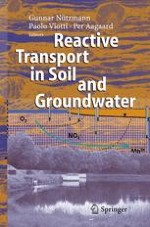2005 | OriginalPaper | Chapter
Use of stable isotope analysis to assess biodegradation of petroleum hydrocarbons in the unsaturated zone. Laboratory studies, field studies, and mathematical simulations
Authors : D. Bouchard, D. Hunkeler, P. Höhener, R. Aravena, M. Broholm, P. Kjeldsen
Published in: Reactive Transport in Soil and Groundwater
Publisher: Springer Berlin Heidelberg
Activate our intelligent search to find suitable subject content or patents.
Select sections of text to find matching patents with Artificial Intelligence. powered by
Select sections of text to find additional relevant content using AI-assisted search. powered by
Compound-specific isotope analysis is increasingly used to demonstrate contaminant degradation in groundwater. The method relies on the frequent occurrence of characteristic shifts in the isotope ratios of contaminants due to the faster degradation of molecules with light isotopes compared to those with heavy isotopes. The goal of the study was to evaluate if the method can also be used to assess biodegradation of petroleum hydrocarbons in the unsaturated zone. The study included laboratory experiments to determine isotopic enrichment for biodegradation of petroleum hydrocarbon compounds under unsaturated conditions and a field experiment. The field experiment consisted of burying an artificial fuel source in the unsaturated zone at a site in Denmark. Concentration and isotope ratios of individual compounds were monitored using a dense network of sampling points. Significant shifts of the isotope ratios of most of the compounds occurred. Initially, a depletion in
13
C with distance was observed likely due to the faster diffusion of molecules with
12
C only. Later, most of the compounds became in enriched in
13
C compared to the source due to biodegradation. To evaluate the relative contribution of diffusion and biodegradation in more detail, the concentration and isotope ratio evolution was simulated using an analytical model. The calculations confirmed that diffusion can lead to significant isotope fractionation at early times. For hydrogen isotopes, the effect of diffusion relative to biodegradation is expected to be smaller due to the large hydrogen isotope fractionation frequently observed during biodegradation of organic compounds. In conclusion, the study demonstrates that especially at early times after spills, the effect of diffusion has to be taken into account in the interpretation of isotope data from the unsaturated zone. Furthermore, it demonstrates that for many compounds, hydrogen isotopes are likely the more sensitive indicator of biodegradation.
